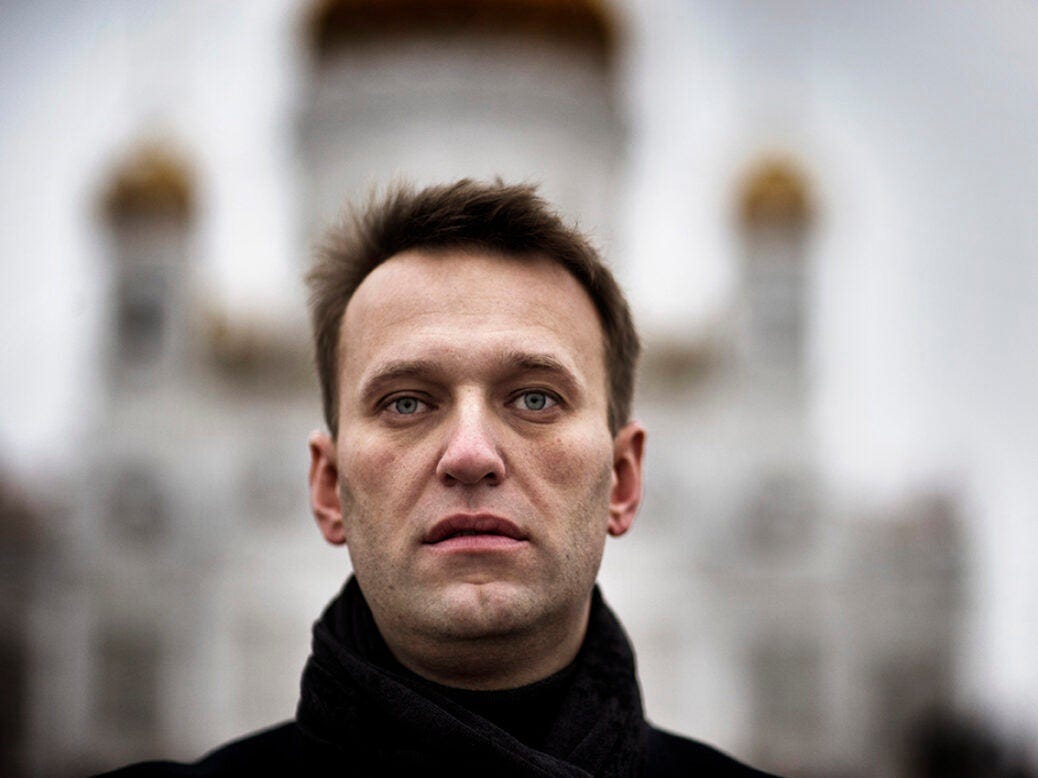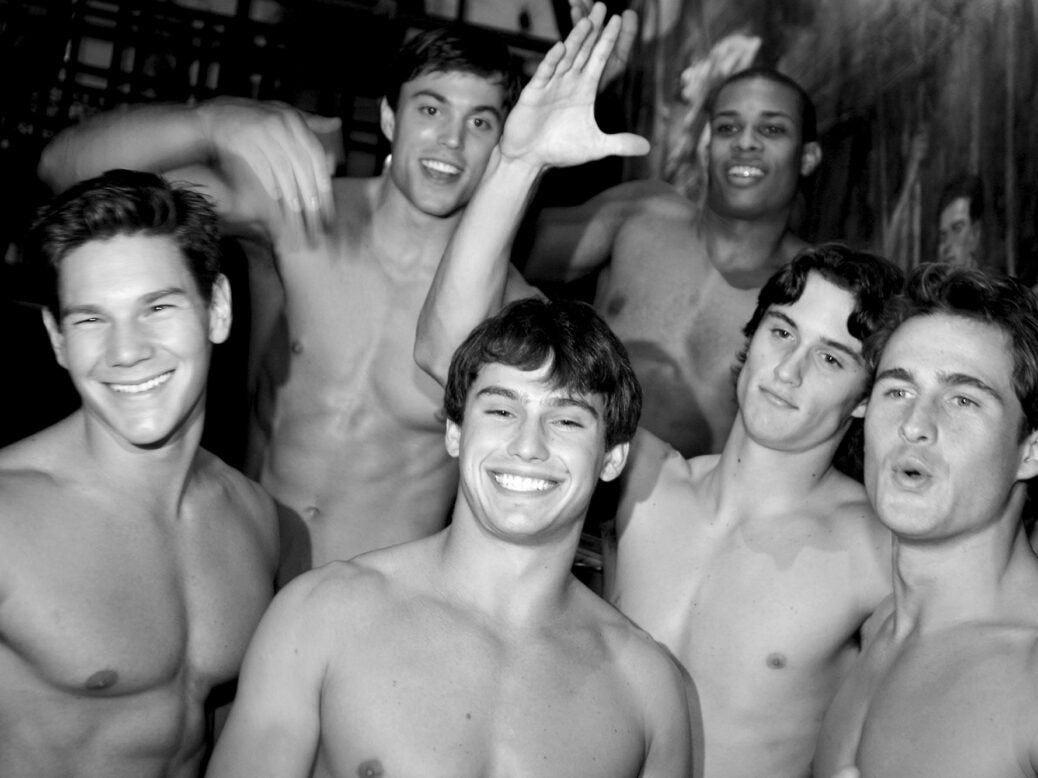The Saturday Read: Mere political games
Inside: Navalny, Musk, Abercrombie & Fitch, Leo Robson on Pedro Almodóvar, Ed Smith, Maga rallies in Michigan and nihilism in Sheppey
Good morning. Welcome to the Saturday Read, the New Statesman’s guide to politics, culture, books, and ideas. This is Jason, together with Finn, Nicholas, Pippa, and George.
Westminster politicos are enthralled by and in thrall to the American political scene. A day scarcely passes without one MP or Spad referencing The West Wing or gossiping about the latest developments inside the Beltway. The BBC treats American news like a “home” story while ignoring much of the rest of the world in its primetime news bulletins.
I recall the excitement of Douglas Alexander, the then shadow foreign secretary, when David Axelrod, a former adviser to Barack Obama, agreed to work as a strategist on Ed Miliband’s 2015 election campaign. Wow – David Axelrod, no less! It was a form of cultural cringe and exaggerated deference. The result: Axelrod had no effect. Miliband lost abjectly and David Cameron went on to hold the Brexit referendum in 2016.
This week the Labour leadership was reeling after the Trump campaign filed a Federal Election Commission complaint against the party. “Far-left” Labour was accused of “blatant foreign interference” in the US election. Sofia Patel, head of operations at Labour, had posted on LinkedIn encouraging Labour activists to campaign on behalf of Kamala Harris and the Democrats. “I’m planning a trip for Labour Party staff to help our friends across the Pond elect the first female president (second time lucky!).” It was a foolish post, quickly deleted.
In March I travelled to Washington with David Lammy. The purpose of the trip was for Lammy to build networks with senior Republicans in preparation for a future Trump presidency. He met, among others, his “friend” JD Vance and more recently saw Mike Pompeo in London. A lot of work has been done and, as the events of this week showed, can easily be undone. Trump is capricious, erratic and a grudge-bearer.
Labour despises him and the feeling is mutual. Could Lammy and Labour be banned from the White House under a Trump presidency? Or welcomed yet as “friends”. Expect the unexpected. Enjoy the weekend.
The picks…
Good morning, Finn here. This week we’ve been looking to America: does Donald Trump really dislike Keir Starmer? Has Kamala Harris blown it? And who are these few voters about to determine the trajectory of the entire election? Important questions, all answered below. We also meet swing voters in Sheppey and pop darling Self Esteem. Nick signs us off with some righteous consternation at the state of London nightlife. As ever, thanks for reading and have a great week.
1—“Starmer has become a bête noire”
Freddie gets deep into the weeds about what is really behind the American right’s hostility to Keir Starmer’s Labour. But the bigger story, he suggests, is how this row is distracting from Elon Musk’s “potential interference” this election cycle. FMcR
The day after the Trump campaign filed its complaint against Labour, the American journalists Matt Taibbi and Paul Thacker opened another front in the war on Starmer. They published internal documents that showed a British disinformation think tank wanted to “Kill Musk’s Twitter”. The Centre for Countering Digital Hate (CCDH) has long been a target for the right. It was set up by McSweeney and Imran Ahmed in 2018 to campaign against online hate, but is now pilloried as a vehicle for the anti-free-speech establishment. In 2023, long after McSweeney had left to join Starmer’s team, Elon Musk sued the CCDH for allegedly exaggerating the rise in hate speech on X. Even though McSweeney is no longer associated with the CCDH, Taibbi framed McSweeney as masterminding a network that is planning to dismantle Musk’s empire. On 22 October, Musk posted about Taibbi’s story on X, along with a large picture of Starmer and the comment: “This is war”.
2—“The book will be my memorial.”
In his posthumous memoirs, the Russian dissident Alexei Navalny exhibits much of the dark humour that characterised his political campaigning. And he writes with prescience of his anticipated death at the hands of the Kremlin. Katie Stallard reviews Patriot. PB
“Wow, what a dramatic turn in my book,” Navalny writes from his bare concrete cell shortly after returning to Russia. “My last chapter was written in a beautiful house in Freiburg, Germany. This chapter is being written in prison.” In a series of farcical court trials during the months and years that follow, he is sentenced to ever longer prison terms, to be served in ever harsher conditions, as he laments that what was “originally an autobiography with an intriguing thriller about uncovering an assassination attempt using chemical weapons, has turned into a prison diary. It’s a genre so saturated with clichés that it’s impossible not to write them.”
3—“Joe Biden and his grasping inner circle”
Did Kamala Harris ever really stand a chance of winning? Given the vice-president had just 100 days to organise across crucial swing states, put together a plausible policy platform and convince voters she was competent and likeable, Megan Gibson thinks not. The Democrats lost this campaign long before she became the candidate. PB
From the moment 81-year-old Joe Biden began his disastrous performance in the televised debate against Trump in Atlanta on 27 June, the Democrats’ chances of winning bottomed out. What had been whispered about inside the Washington Beltway was now obvious for all to see: Biden was far too old and diminished to win a debate, let alone contest an election and serve another four years as president. While the party privately panicked, his inner circle initially said he had a cold, and then blamed jet lag for Biden’s inability to stage a credible debate. It took another month of febrile speculation and intense pressure from party heavyweights such as Nancy Pelosi before Biden finally dropped out of the race.
4—“The lust for red”
Have you seen the new Pedro Almodóvar film? Leo Robson has seen them all. In this exceptional meditation on the Spanish director’s body of work, Leo makes the case that Almodóvar’s most consistent theme and muse is literature. NH
It is a clear admission – from a film-maker strongly associated with costume, production design and bodies – of an essential bookishness: his belief, expressed in his recently published collection of stories The Last Dream, that his vocation is “literary”, and it’s merely a quirk of fate that the bulk of his written output has been 22 screenplays, which he also directed. The film concerns two writers, Ingrid, a war reporter suffering from cancer (Tilda Swinton), and Martha (Julianne Moore), a novelist with whom Ingrid spends her final weeks. Though Almodóvar does away with many of the reference points in the source material, Sigrid Nunez’s novel What Are You Going Through, he introduces plenty of his own. The Room Next Door opens at a Manhattan bookshop, where Martha is doing a signing, and ends with a quotation from “The Dead” – and it isn’t the only bookshop, or mention of James Joyce.
5—“There are no good band names”
Each week in the Saturday Read we like to bring you the latest insights on pop. And we’ve rattled through some big names: Charli XCX, Taylor Swift, Sabrina Carpenter. Now this week Kate Mossman meets Self-Esteem, a smaller artist who has a few choice words about her more famous contemporaries. FMcR
The hype around the record was so great that Taylor went numb and has forgotten much of that time, she says. Today, her PR suggested she might be more comfortable staying in the company office over the road for this interview. “I said, people won’t recognise me! I’m not famous!” Now she must represent herself anew in a world that allows female pop stars to last as long as fruit flies. “I made the last album before ‘Brat’ existed,” she sighs, in reference to the album that brought Charli XCX into the mainstream, “or Sabrina f***ing Carpenter or Chappell Roan. When ‘Prioritise Pleasure’ came out there was still not much going on, female-wise, and now it’s everywhere – they’re a thing now, women! It’s supremacy!”
To enjoy our latest analysis of politics, news and events, in addition to world-class literary and cultural reviews, click here to subscribe to the New Statesman. You'll enjoy all of the New Statesman's online content, ad-free podcasts and invitations to NS events.
6—“Lights on the dashboard flashing red”
The constituency of Sittingbourne and Sheppey on Kent’s north coast is one of the most deprived in Britain. It is also a bellwether. Rachel Cunliffe and our podcast team travelled there this week to speak to voters. They found apathy instead of anger, and nihilism in place of rage. FMcR
Less than an hour’s drive from the glitzy skyscrapers of Canary Wharf, just off the M2, lies the Tudor Rose, a classic English pub that has stood on the site since 1750. A popular spot for a Sunday roast, it was relatively quiet when ten people arrived on a damp Monday evening in October and began filing upstairs. They included a teaching assistant, a plumber, a London Underground engineer, a carer and part-time cleaner, and a retired newspaper printer. All were from the constituency or neighbouring Kent seats – an area with one of the highest patient-to-GP ratios in the country. And, one that ranks as one of the most deprived constituencies in terms education and skills training, despite its proximity to the lucrative financial centre of the UK.
7—“It seems very grubby now”
Abercrombie & Fitch’s former CEO was arrested this week for prostitution and sex trafficking. We should have found the brand gross long ago, writes Imogen West-Knights. GM
Looking back at the era my friends and I grew up, I see something nasty that did not seem nasty to me then. Where I grew up in London, it was generally known that it was possible to get scouted for an Abercrombie job at Westfield shopping centre, and that if you had a job at Abercrombie, it said something about you. Namely: you were hot. Abercrombie & Fitch weren’t the only ones in this game. There was also American Apparel, whose employees were notoriously unfriendly attractive types, and whose advertising featured over-exposed, lightly pornographic photographs of young people wearing their clothes.
8— “I am with the felon”
We already know enough about Trump – the felonies, the assassination attempts, the freewheeling populism. So Bruno Maçães headed into the crowd at a Michigan rally to understand the people who may determine November’s election: the Maga army of supporters behind him. NH
His speeches are superficial and rambling, but the point, perhaps, is not to distract you from his personality. How can the election be about policy if no dialogue on policy is even possible? One older African American man at the town hall told me that he and his two grown sons have agreed they will never talk about politics. If they did, their relationship would not last. The same arrangement seems to me to operate across the nation. The two sides will not talk to each other. The election is a combat between two auras and each side must try to inflict as much damage as possible on the opposing aura, so that it shines less brightly.
8—“What is winning, really?”
What doth it profit a business, to turn a profit? Not much, says Ed Smith in his review of a new study of corporate history and business management. Companies that win in the long run have more than money at stake – and that’s something to everyone’s benefit. NH
Businesses need to be profitable to stay alive over the long run. But while profit is necessary, it is neither sufficient nor complete (in any analysis). Further – and here again sport and business converge – seeking profit doesn’t even correlate with being profitable. Being good and staying good, with profits accruing via obliquity, is a surer path. The businesses Kay admires are able to keep employees engaged with the process of finding and then retaining a competitive advantage. The fun resides in the “edge”; profit is just one of the by-products. In the same vein, great sports coaches achieve wins by freeing up players to focus on the playing rather than the winning. Winning is always there, of course, but it is no longer the fickle tyrant king of the circus.
George’s Best of the Rest
Charlotte Klein: Can the media survive?
Tad Friend: A controversial rare book dealer tries to rewrite his own ending. An unexpectedly binding read
Phil Klay: And Evelyn Waugh a Catholic!
Elisa Gabbert: The essay as realm
Will Lloyd: Dubai’s allure to UK youth should alarm us
Elizabeth Goldring: At Kenwood House
Sarah Lyall: Is Hugh Grant’s most convincing character “Hugh Grant”?
New Zealand airport caps goodbye cuddles at three minutes. Booo!
And with that…
“A sort of Weimar without the sex”, was how Christopher Hitchens unimprovably described joyless Britain in the late 1970s. The country has returned to a similar condition of bleak, stagnant ungovernability over the past few years. The least we might have expected is a debauched youth subculture to accompany it – even if not quite to the degeneracy of 1920s Berlin. Instead, the old dynamic has recurred, and even by English standards the nation seems locked in a condition of anti-festivity.
This week, new findings from the Night Time Industries Association found that clubbing could be “extinct” by end of the 2020s, with 37 per cent of venues having permanently shut since March 2020. Blame is laid on the many-headed stranglehold of rising rents, licensing issues, business rates and energy inflation. The report’s suggested palliatives seem themselves evidence of decline: establishing a “Heritage Protection scheme” to protect Fabric, Ministry of Sound and Sub Club will not make them cool or profitable again.
I’ve already noticed the ritual of the British night out – anticipatory pre-drinking, freezing club queue, maudlin night bus, all the stuff of early Arctic Monkeys – is one I indulge ever less frequently. The main reason is expense, an economic logic that leads you not to the cocktail bar, let alone the Berlin cabaret, but to the local. A Gen Z loneliness crisis is diagnosed with monthly regularity in the press, with social media, Church attendance and online dating frequently cited. But the social instinct cannot be killed off easily. What’s truly lethal is our lack of means to exercise it.
— Nicholas
The New Statesman is home to the finest writing on politics, culture and ideas. To stay up to date, subscribe using the link above.



















Great collection this week. Thanks, guys and gals.
You "progressives" began to beat up on Starmer the day after the election. (At least you waited THAT long.)